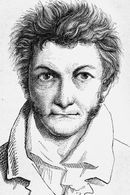E.T.A. Hoffmann, a literary giant, was born on January 24, 1776, in Königsberg, Prussia, which is currently part of Russia, to a lawyer father. Following his father's untimely demise, Hoffmann's childhood was marked by adversity, but he eventually found solace in academia, enrolling at the university to study law between 1792 and 1795.
After completing his studies, Hoffmann secured a position in the bureaucratic services of the Prussian state, although his performance was deemed mediocre. He went on to hold various stations in Bamberg, Poland, and other locations, ultimately securing a good job in Berlin, culminating in his appointment as a judge in 1814. Tragically, Hoffmann's life was cut short on June 25, 1822.
Throughout his life, Hoffmann's interests were remarkably diverse. He was a skilled musician, painter, and writer, producing numerous exceptional works of German literature. His distinctive writing style, often characterized by a critical tone, did not always garner widespread acclaim during his lifetime. Regrettably, his musical and artistic endeavors have largely faded into obscurity, but his literary masterpieces continue to captivate readers to this day.
Hoffmann's most notable works, such as "Kater Murr" and "The Sandman," are often associated with the darker aspects of human nature and the human soul. While he did produce more conventional literature, his enduring fame is largely due to his remarkable contributions to the "dark" literary canon.




























